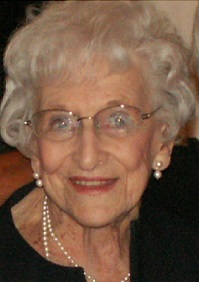Betty Ladd Andre
Life Dates: b. April 10, 1918, d. August 20, 2016
Full Name: Mary Elizabeth Ladd Andre
Birthplace: Detroit, MI
Tags: Business, Community Activism, Oral History
Betty Ladd Andre made her mark on the Grand Rapids community as an advocate for and builder of affordable housing and as a community activist. She was born in Detroit, Michigan, a few years before the Great Depression. Her parents, both of whom emigrated from England, met and married in Canada before moving to Detroit. Her father worked as an architect for a large steel company, and her mother was an artist. They both sang in the church choir, and a large part of Betty’s childhood revolved around music, art, and the ballet.
During the Great Depression, Betty’s father lost his job and became a janitor. At the age of 40, Betty’s mother passed away due to a heart condition and 6 months later her 13-year-old brother died. Shortly after this tragic turn of events, Betty and her father lost their home and had to live with friends as boarders for the next 3 years. Although Betty and her father were hurting financially, her father never compromised his daughter’s happiness; he continued to take her to concerts and plays as often as he could.
Betty quit high school the year before her mother died in order to help take care of her, but soon after her mother’s death, Betty returned to high school and pursued an education at Wayne State University with the hope of becoming a special education teacher. Betty worked several jobs throughout her college years in order to help offset the costs, including those on a streetcar, with a telephone company, and at a lumber yard. In order to get her job at the lumber yard, Betty taught herself how to type and how to drive in only a week. In this position she met her first husband, Everett Ladd. Betty then took a supervisory position at a telephone company, prompting her to stop out at Wayne State University after her junior year. She was making more money at that time than she could have as a teacher. After three years of dating, she married Everett, had two children (Patti and Jamie), and moved up to Torch Lake.
At Torch Lake, Everett built cabins through his real estate office in Elk Rapids, hoping to sell the cabins at the end of WWII. When the cabins didn’t sell, the family decided to move to Grand Rapids. Once in Grand Rapids, Everett and Betty began to grow Everett’s building business, with Betty handling the books, the selling, and furnishing the model homes. Betty also found herself fighting for people who were just shy of affording the monthly payment for one of their homes; on several occasions, she went to an interested tenant’s boss to seek a raise for him, so he could afford the home. It was through these experiences that Betty found herself interested in low-income housing.
As the business grew, Betty was raising her two children and staying as active in their lives as she could. She was involved in Cub Scouts and Brownies, as well as being the president of the PTA. Staying close to her family was always important to Betty, so it was not surprising that her father, an architect, was involved in Everett’s building company in several ways. At Everett’s request, Betty’s father taught Everett how to draw and how to build FHA homes. For the next several years, Betty and Everett built affordable housing throughout the City of Grand Rapids. In the late 1970s, Betty received the honor of being the Department of Housing and Urban Development’s Head Woman of the Year, a cherished honor for Betty. After 35 years of marriage, Everett died of cancer, and Betty and Everett’s son Jamie took over the family business and continued to build affordable housing.
Betty remarried Dr. Harvey Andre and remained involved in advocating for affordable housing. She served on the Emeritus Board of Aquinas College and the Women’s Board at Porter Hills; she was involved with the Breton Garden Club and the St. Mark’s Community Involvement committee. Betty and her family also gave time and resources to the Dwelling Place, GRACE, Bridge, and other similar agencies in downtown Grand Rapids.
Sources
This biography is adapted from a summary of a transcript of an oral history interview with Betty Ladd Andre. Learn more about Grand Rapids women’s oral histories here.
“Betty Ladd Andre.” Metcalf & Jonkhoff Funeral Service, 2016. https://www.metcalfandjonkhoff.com/obituary/Betty-LaddAndre.

